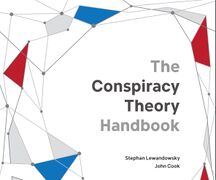News Gallery: Difference between revisions
No edit summary |
|||
| Line 15: | Line 15: | ||
{| | {| | ||
|- | |- | ||
|'''Toyota is quietly pushing Congress to slow the shift to electric vehicles’''' | |||
[[File:Toyota image search.jpg|center|thumb| [https://www.theverge.com/2021/7/26/22594235/toyota-lobbying-dc-ev-congress-biden-donation By Andrew J. Hawkins@andyjayhawk Jul 26, 2021 The Verge]]] The company came under fire recently after it was revealed that it was the largest corporate donor to Republican lawmakers who objected to the certification of the 2020 presidential election. A majority of those politicians also dispute the scientific consensus on climate change. Toyota initially defended the contributions, but then later said it would halt them. You know things are bad for the company when a Toyota spokesperson has to confirm to the Times that the automaker does indeed believe that climate change is real. | |||
|'''The Seas Are Rising. Could Oysters Help?’''' | |'''The Seas Are Rising. Could Oysters Help?’''' | ||
[[File:Oysters.jpg|center|thumb| [https://www.newyorker.com/magazine/2021/08/09/the-seas-are-rising-could-oysters-protect-us By Eric Klinenberg August 2, 2021 The New Yorker]]] “A lot of coastal infrastructure lacks surface complexity,” Pippa Brashear, one of Orff’s colleagues at scape, told me. “It’s mostly hard walls.” The scape project will be the opposite. “If you put on a scuba suit and swim around Living Breakwaters, you’ll see something that looks like an oyster reef, with lots of nooks and crannies,” she said. “It’s designed to be messy, with lots of little critters, invertebrates like tunicates, really colorful sponges, young sea bass and striped bass and silversides darting around and finding places to hide. Then we’ll have the oysters, hopefully tons of them. It’ll be teeming with life.” | [[File:Oysters.jpg|center|thumb| [https://www.newyorker.com/magazine/2021/08/09/the-seas-are-rising-could-oysters-protect-us By Eric Klinenberg August 2, 2021 The New Yorker]]] “A lot of coastal infrastructure lacks surface complexity,” Pippa Brashear, one of Orff’s colleagues at scape, told me. “It’s mostly hard walls.” The scape project will be the opposite. “If you put on a scuba suit and swim around Living Breakwaters, you’ll see something that looks like an oyster reef, with lots of nooks and crannies,” she said. “It’s designed to be messy, with lots of little critters, invertebrates like tunicates, really colorful sponges, young sea bass and striped bass and silversides darting around and finding places to hide. Then we’ll have the oysters, hopefully tons of them. It’ll be teeming with life.” | ||
Revision as of 11:10, 8 August 2021
Important and Overlooked Stories on the Web
***Curated Web Exploring***
Toyota is quietly pushing Congress to slow the shift to electric vehicles’
 |
The Seas Are Rising. Could Oysters Help?’
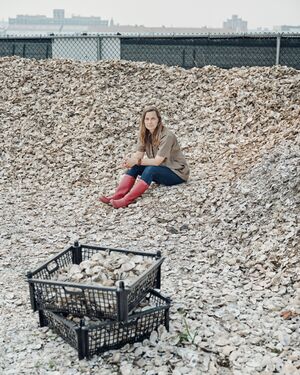
|
It could feed the world’: amaranth, a health trend 8,000 years old that survived colonization’
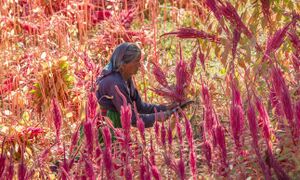 |
Americas Bolivia's lake Poopo dries up and scientists fear refill unlikely’
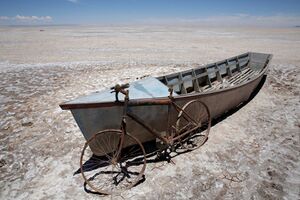 |
Environmental impact of bottled water ‘up to 3,500 times greater than tap water’
 |
For Billion-Dollar COVID Vaccines, Basic Government-Funded Science Laid the Groundwork
 |
Why are so many babies dying of Covid-19 in Brazil?
 |
How the Supreme Court laid the path for Georgia's new election law
 |
From Crisis to Reform: A Call to Strengthen America’s Battered Democracy
 |
New stars on the American flag? Fresh hope as Puerto Rico and DC push for statehood
 |
Two of India’s richest men face farmers’ ire over new laws Two of India’s richest men have landed in an unlikely controversy over farming laws, becoming targets of protesters who allege the tycoons have benefited from their close links to Prime Minister Narendra Modi. The new farm legislation, passed in September, will allow private companies to buy produce directly from farmers, moving from the decades-old system of state-run wholesale buyers and markets that guaranteed a minimum support price. India’s top court last week barred the implementation of the law until the court decides on the matter. |
Underestimating the Challenges of Avoiding a Ghastly Future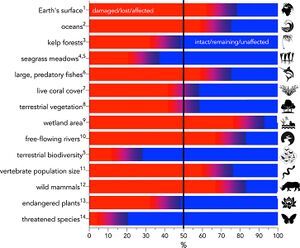 Major changes in the biosphere are directly linked to the growth of human systems (summarized in Figure 1). While the rapid loss of species and populations differs regionally in intensity (Ceballos et al., 2015, 2017, 2020; Díaz et al., 2019), and most species have not been adequately assessed for extinction risk (Webb and Mindel, 2015), certain global trends are obvious. Since the start of agriculture around 11,000 years ago, the biomass of terrestrial vegetation has been halved (Erb et al., 2018), with a corresponding loss of >20% of its original biodiversity (Díaz et al., 2019), together denoting that >70% of the Earth's land surface has been altered by Homo sapiens (IPBES, 2019). There have been >700 documented vertebrate (Díaz et al., 2019) and ~600 plant (Humphreys et al., 2019) species extinctions over the past 500 years, with many more species clearly having gone extinct unrecorded (Tedesco et al., 2014). Population sizes of vertebrate species that have been monitored across years have declined by an average of 68% over the last five decades (WWF, 2020), with certain population clusters in extreme decline (Leung et al., 2020), thus presaging the imminent extinction of their species |
Bellingcat breaks stories that newsrooms envy — using methods newsrooms avoid
 The investigative collaborative — which relies on both paid and volunteer researchers combing through “open-source” digital data available to anyone with the right searching skills — has been responsible for several eye-popping scoops: pinning the crash of a Malaysian airliner in Ukraine to a Russian missile, unmasking spies supposedly behind the poisoning of a Russian double agent in England and dissecting the racist motives of the Christchurch, New Zealand, mosque mass shooter. |
These wild lands in California and the West may soon get federal protection But that’s not the end of the story. There are still legions of activists working to get the bill across the finish line. They’ll keep at it when the next Congress is seated in January, with an eye toward protecting 30% of U.S. lands and waters by 2030. |
America's Vaccine Rollout Disaster It’s happening all over again. For months, Americans who despaired about the country’s coronavirus-suppression efforts looked desperately to the arrival of a vaccine for a kind of pandemic deliverance. Now that it has arrived, miraculously fast, we are failing utterly to administer it with anything like the urgency the pace of dying requires — and, perhaps most maddeningly, failing in precisely the same way as we did earlier in the year. That is, out of apparent, near-total indifference. |
A huge study of 50 years of tax cuts for the wealthy suggests 'trickle-down' economics makes inequality worse. <embed>https://www.businessinsider.com/tax-cuts-rich-trickle-down-income-inequality-study-2020-12?fbclid=IwAR1ppv6ngBVFRDNuNAeDpCrsezYPPt25Gaap_f0G_8f6fmTTu7vmCaCSaFY </embed>
"Our analysis finds strong evidence that cutting taxes on the rich increases income inequality but has no effect on growth or unemployment" in the short and long term, the researchers wrote.After major tax cuts for the rich were introduced, the top 1% share of pretax national income increased by almost 1 percentage point, they found. |
| <embed>https://www.dailykos.com/stories/2020/12/3/1999711/-The-Supreme-Court-is-ready-to-revive-a-policy-to-make-most-of-the-government-unconstitutional</embed> |  The founding generation was deeply skeptical of what it called “pure” democracy and defended the American experiment as “wholly republican.” To take this as a rejection of democracy misses how the idea of government by the people, including both a democracy and a republic, was understood when the Constitution was drafted and ratified. It misses, too, how we understand the idea of democracy today. |
Vote in Poll
Good Long Reads
-
The Reagans by Charles Bramesco Nov 2020 The Guadian'They created a false image': how the Reagans fooled America
<paypal></paypal>
Model Layout (Edit Source)
|Headline’
center|thumb| [Url Byline] Fair Use Quote from article










